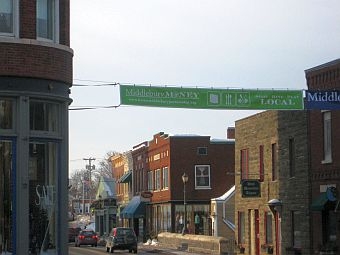 (Host) Towns are always looking for ways to encourage people to spend their money close to home. One of the ideas that’s been tried in the past is creating a local "currency" that a businesses in a community accept in lieu of cash.
(Host) Towns are always looking for ways to encourage people to spend their money close to home. One of the ideas that’s been tried in the past is creating a local "currency" that a businesses in a community accept in lieu of cash.
As VPR’s Melody Bodette reports, even though the concept has had limited success, some towns are looking to revive it.
(Bodette) Vermont’s biggest experiment with a local paper currency was in Burlington.
It was called "Burlington Bread" and was launched in the late ‘90s as a way to boost the city’s economy.
Burlington Bread was designed just like U.S. currency. But instead of being printed in denominations of the dollar, it was denominated in slices of bread.
At one point as many as 20,000 "slices" were in circulation.
Amy Kirschner took over at the Burlington Currency Project in its last few years. She says problems developed.
(Kirschner) "The most popular businesses, always food businesses, would end up with a stockpile of bread, and they were always the ones who were dissatisfied because they had nowhere to spend it. We tried to get them to give it back in change but that was difficult, it literally didn’t fit in cash registers, it was slightly too big, so it stayed in the back offices."
(Bodette) A business could accept bread in lieu of cash, but then couldn’t convert it into dollars. So their only choices were to spend bread at another business that accepted it, or to pay their employees with it. Soon stores stopped accepting bread altogether.
Burlington Bread finally fell apart after ten years in circulation.
Kirschner says she learned competing with the U.S. dollar is not easy.
(Kirschner) "I think there was the incorrect idea, as the local currencies happened in the ‘80s or ‘90s, that they could voluntarily run and could be done on the side at Friday meetings, during potlucks. These are full time jobs, with professional services needed and if you don’t have a revenue model to support that, you’re going to wind up with unhappy customers."
(Bodette) It’s a message Kirschner recently shared with Transition Putney, which is exploring creating its own local currency.
(Hoviss) "What we’re going to try to do is look at where there were failures and where there were problems and we’ll try to address those head on before we release the currency."
(Bodette) Daniel Hoviss is the chair of the currency committee in Putney.
Instead of competing with U.S. dollars, Hoviss says Putney is looking for a way to work with it:
(Hoviss) "It will be critical for people to be able to exchange their money back for more money, if we’re going to be printing paper, not only is it taxable, but it has to interoperate with real currencies, so there are hurdles ahead."
(Bodette) But if Putney’s money is interchangeable with the dollar, there has to be a reason for people to use the Putney money. And those are the details the group is working to nail down. Hoviss would like to see some of the money used to raise money for renewable energy projects.
Middlebury also added a "hook" to its local currency to encourage people to use it for their own purchases.
"Middlebury Money" was launched 15 years ago by the Better Middlebury Partnership. It’s organized differently because it’s effectively a check drawn on a local bank.
After businesses accept Middlebury money, they can turn it in to the bank for U-S dollars. And businesses make change in dollars, which simplifies transactions for cashiers.
Committee chair Becky Dayton says area businesses are now donating a percentage of all purchases made with Middlebury Money to the area business group, which in turn uses the money for advocacy, marketing and to pay for four yearly events that drive shoppers to the area.
(Dayton) "We’re hoping that people will buy it and use it, give it as tips or reward their employees with it, still we don’t really consider it currency because it’s not. Each bill can only be used once."
(Bodette) Even so, if the goal is getting money into the town’s economy, Middlebury Money seems to be succeeding. $32,000 worth of the bills were sold last year.
For VPR News, I’m Melody Bodette.